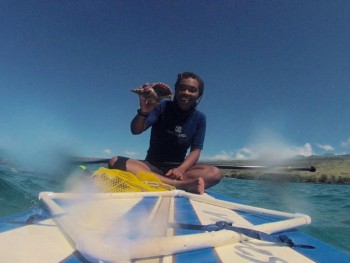Q & A with Jillian Lyles

What led you to pursue a Master of Marine Affairs?
As an undergrad, I majored in ocean sciences and double minored in marine biology and natural resource management. Through my studies and subsequent time out of school, I began to realize how important it is that we effectively manage human activities surrounding marine affairs issues in an effort to ensure that the environment and ocean resources are conserved. I thought that a degree in marine affairs would provide me with the knowledge and skill set to tackle these issues.
Why did you choose UW’s SMEA for graduate school?
University of Washington has great resources to take advantage of. A combination of the faculty, program design, and curriculum offered by the School of Marine and Environmental Affairs made it the best suited program for my interests.
What are you writing your thesis about and why? If you haven’t decided, what do you think you might write about and why?
I am primarily interested in traditional ecological knowledge (TEK), its role in modern day management plans, and how TEK can be utilized in conjunction with western science to better inform environmental decision making. For my thesis, I am focusing on loko i’a, or fishponds, which are aquaculture systems developed in ancient Hawai’i. I am collaborating with several agencies in Hawai’i to (1) develop guidance for loko i’a practitioners to successfully navigate the policy and regulatory environment for fishpond restoration and production and (2) assess the primary challenges to loko i’a restoration and production and investigate the successful strategies that practitioners are engaged in to meet these challenges.
What has been your favorite class at UW so far? Why?
My favorite class at the University of Washington thus far has been one of the practical skills workshops offered through the Evans School of Public Affairs. The one credit, two session course was called Writing for Decision Makers and I have nothing but good things to say about it (even though it took over two of my Saturday mornings). I gained practical skills to more effectively reach policy makers and better communicate recommendations.
What do you like most about SMEA?
The environment of SMEA allows you to take your degree and turn it into whatever you want. Students are encouraged to reach outside of SMEA and gain an integrated, multidisciplinary perspective of marine affairs and all interconnected disciplines.
What’s it like to live in Seattle? What do you do in your spare time?
Seattle is a great place to live, and it really doesn’t rain as much as people says it does. The summers are perfect (75 and sunny) so it is a fun place to be. Also Seattle is full of people with diverse interests, so whatever you like to do, you can find others here who enjoy the same things. In my spare time I take in the spectacular views, paddle with Seattle Outrigger Canoe Club, laugh with friends, and climb at the Seattle Bouldering Project.
If you could design your ultimate job after graduating, what would it be and why?
Ideally, I would like to be a program/project manager who oversees marine conservation and management initiatives and fosters dialogue between stakeholders surrounding marine affairs issues, preferably in affiliation with a community based organization.
What is your favorite form of marine life, and why?
I really like cephalopods–they are such intelligent creatures and I could watch them all day long. I also think scallops are some of the most underappreciated marine creatures and think they are pretty rad.